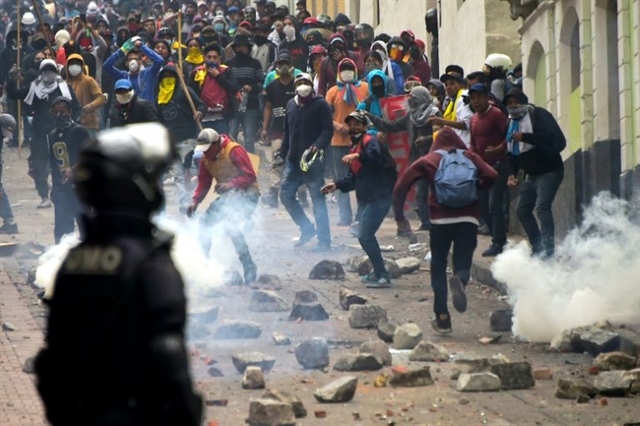 World
World


|
| Demonstrators clash with riot police in Quito, as thousands march against Ecuadorean President Lenin Moreno's decision to slash fuel subsidies. — AFP Photo |
QUITO — Protesters in Ecuador fought a running battle with security forces on Wednesday in a second day of violent protests over a fuel price hike that forced the government to suspend most of the country's deliveries of crude.
The violence broke out as thousands of people representing indigenous groups, farmers, students and labor unions marched on a square in Quito's historic center near the government headquarters.
Masked demonstrators threw Molotov cocktails and paving stones. Clouds of tear gas and palls of black smoke from burning tires rose over the colonial downtown area, a UNESCO world heritage site.
After clashes broke out in the area on Tuesday, the government of President Lenin Moreno posted security forces to keep the march from reaching the plaza.
Protesters on Wednesday broke off from the main procession and hurled rocks at riot police, who fought back with volleys of tear gas and water cannon.
Several people were injured in the clashes.
The protesters are demanding that Moreno reinstate fuel subsidies that were rescinded after $4.2 billion in loans were agreed with the IMF.
Oil industry hit
The unrest threatened to inflict wider damage on an already weakened economy.
The energy ministry announced it was shutting down one of the country's two domestic oil pipelines, effectively suspending two-thirds of its distribution of crude.
"Due to this shutdown, we are analyzing the possibility of declaring Force Majeure," a mechanism to avoid the country incurring penalties for postponing crude shipments, the ministry said in a statement.
Protesters seized three oil facilities in the Amazon earlier this week.
Ecuador, which exited the OPEC international oil cartel last week citing economic constraints, produced over 500,000 barrels-per-day (bpd) -- which was worth some $4.6 billion in exports in the first six months of the year.
However, Wednesday's shutdown accounts for 68 per cent of its oil output, the ministry said, adding that the protests had cost $12.8 million in lost production to date.
Moreno's government has held talks with protest groups but Wednesday's march proceeded anyway.
On Tuesday, clashes between security forces and protesters broke out near Congress and demonstrators -- many of them indigenous men armed with sticks and whips -- surged through a security cordon and into the building before being pushed back.
The demonstrations broke out after increases of up to 120 per cent in fuel prices came into force on October 3.
They have left one civilian dead and 77 people injured, the majority of them security forces, the government said. Prior to Wednesday's protest, 477 people had been detained.
Dialogue
Discussions with leaders of the powerful indigenous umbrella organisation CONAIE took place in Guayaquil, some 270km southwest of the capital.
"There is dialogue with the brother indigenous peoples who unfortunately have needs," Moreno said.
He also offered to free up resources for those hit hard by the rise in fuel prices.
In Washington, a senior US official backed the allegations and voiced hope that all sides in Ecuador would sort out their differences peacefully. — AFP




